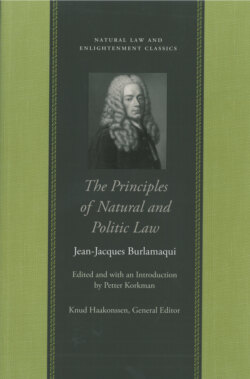Читать книгу The Principles of Natural and Politic Law - Jean-Jacques Burlamaqui - Страница 11
На сайте Литреса книга снята с продажи.
ОглавлениеTo Dr. MEAD.
Sir,
To intrude in this manner upon your time, so usefully employed in the duties of your profession, would expose me in some measure to blame, were it upon a less important occasion than that of recommending the following work to your generous protection. The dignity of the subject, which, handled by other pens, has been thought worthy of being inscribed to the most illustrious personages of the last and present age, will plead, I hope, some excuse for an address, which is designed not so much to interrupt your occupations, as to avail itself of the sanction of your name in introducing this work to the public. And indeed a nobler subject I could not select for the favour of your acceptance, than that which so nearly relates to the moral duties of life, and the foundation of human contentment and happiness; a subject moreover illustrated by one of the ablest masters of the present age, whose extraordinary ability and skill in curing the disorders of the mind, may be compared very aptly to yours in removing those of the body.1 One of the principal encouragements I had to this address, is the near relation between the following work, and those elevated sentiments with which you have been always inspired. Such an admirable system of moral precepts, such noble maxims of true Christian policy, and such excellent rules for the government of our lives, cannot but be acceptable to a gentleman, who, in the whole tenor of his conduct, has been an illustrious example of those rules and maxims which are here most judiciously established. A very good opportunity this of entering upon the encomium of those virtues which have so eminently distinguished you at the head of your profession; but the little value any commendations of mine would have, the apprehension I should be under of being suspected of adulation, and the danger I should incur of offending your modesty, obliges me to wave any attempt of this nature. However, I cannot help taking notice of that true magnificence with which you have at all times contributed to the advancement of learning, and whereby you have justly acquired the title of patron and protector of letters. In fact, the extensive blessings that fortune has bestowed upon you, have been employed not as instruments of private luxury, but as means of promoting those arts, which have received an additional lustre, since they have shone so conspicuously in your person. Your friendship and correspondence have been courted by the greatest men of the present age; and your house, like that of Atticus, has been open to the learned of all orders and ranks, who unanimously respect you, not only as a supreme judge of learning and wit, but, moreover, as an arbiter elegantiarum, and master of finished urbanity. Your collection of valuable curiosities and books, wherein you have rivalled the magnificence of sovereigns, is the admiration and talk of all Europe, and will be a lasting monument of your love of literature. The polite reception you have always given to the learned of foreign nations has rendered your name so respectable abroad, that you are never mentioned but with expressions denoting the high idea they entertain of your singular munificence. These, Sir, are not particular sentiments of mine; they are the sentiments of the public, whose voice I utter; they are the sentiments of your learned friends abroad, which I have been desired to repeat to you upon a late occasion, together with their compliments of thanks for the marks they have received of your great and disinterested civility.2 It is with pleasure I embrace this opportunity of executing my commission, and of declaring in this public manner the profound respect and esteem with which I have the honour of subscribing myself,
| SIR, | |
| Your most humble and | |
| Gray’s Inn | Obedient Servant, |
| June 4, 1748 | Thomas Nugent. |
